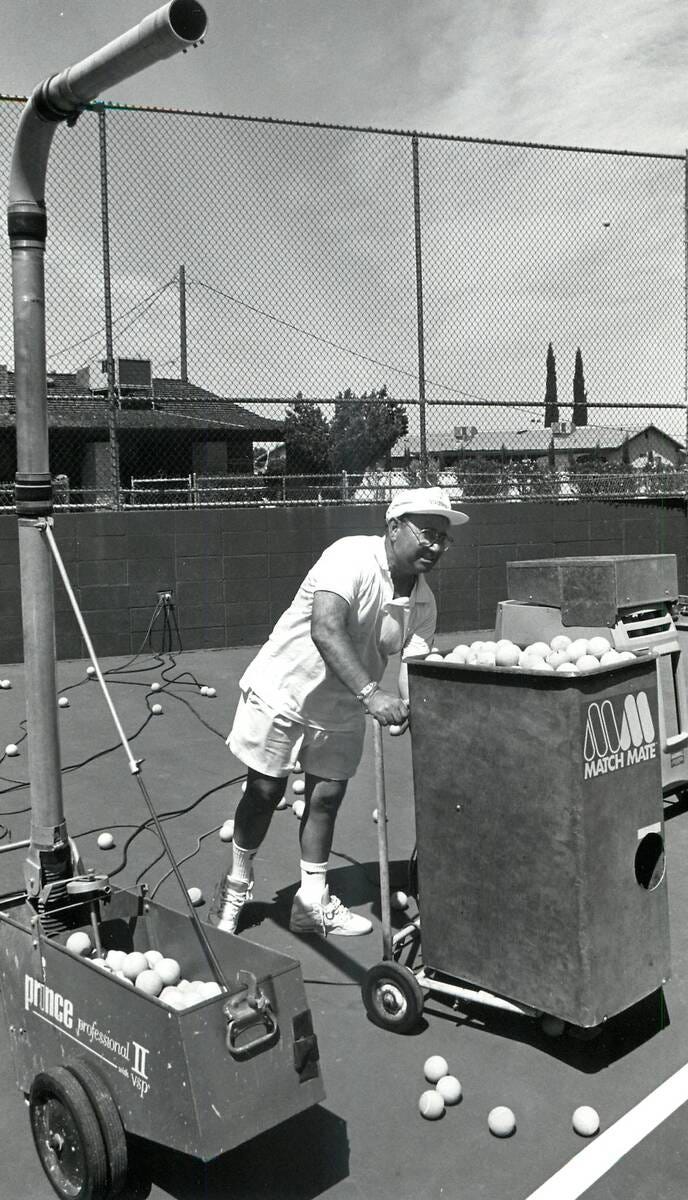Can you succeed at something while hating it? Andre Agassi was widely acknowledged as one of the best tennis players ever. But in his words:
I play tennis for a living even though I hate tennis, hate it with a dark and secret passion and always have
Open: An Autobiography, by Andre Agassi
Agassi was forced to play tennis by his very strict father, who built a tennis court in their backyard (while house hunting, he carried a tape measure, and would immediately head to the backyard to measure if a regulation tennis court would fit). Agassi’s father then customized a ball machine (which Agassi calls the “dragon”), expecting him to hit 1 million tennis balls a year (2,500 balls a day, 7 days a week, 52 weeks per year. “A child who hits one million balls each year will be unbeatable.”
This singular focus continued throughout his childhood. As a teenager, he was sent away to a tennis academy in Florida.
He became one of the greatest players of all time, winning 8 “Grand Slam” events. There was plenty of turbulence, though: he had long streaks of losing, a short marriage to the actress Brooke Shields, and was viewed negatively in the press as a punk. When released almost 15 years ago, Open was critically acclaimed for its…openness. Agassi wrote of his hate of tennis, how he once took crystal meth, how he dated a 3-decades older than him Barbara Streisand. Even though I would not call myself a diehard tennis fan, I found the book very well-written and engaging. My favorite scene is when Agassi’s father meets Peter Graf, the father of tennis star Steffi Graf, Agassi’s now wife. It captures his father showing his love the only way he can: confrontation.
They only met once; they were standing in our garden. Peter had just told my dad that he should have taught me Steffi's slice and that I would have been even better. And then my dad said: '[B.S]. Steffi should have learned Andre's two-handed backhand, and she would have won 32 Grand Slam finals.' Suddenly they were in front of each other, shadowboxing
Themes from the book that resonated
Parenting: The most interesting part of the book by far for me was his relationship with his father, who pushed him extremely hard without providing much explicit affection.
It made me think about my role as a parent.
We all want the best for our kids, but there can be some of our own ego involved. It’s fairly easy to see our kids as extensions of ourselves and view their success as a validation of our own talents and abilities. As a parent, there is a small part of parenting that feels like playing Pokémon: you want to “train” your kids and have them level up. And by the time you are a parent, you are acutely aware of your own failures, shortcomings, and regrets (like Agassi’s father, who was a boxer who never made it big) and you likely want your kids to do better. But do you want this for them or for yourself?
As I wrote about in The Fish that Ate the Whale, I think hunger is one of the most important ingredients for success. But what about when your hunger manifests itself through your kids or others? Also, as you get older, your trajectory becomes narrower. Your kids have more potential and a wider range of outcomes than you have. So it becomes natural to want to invest primarily in your kids.
Obviously, you don’t want to push your kids to hard or force your own ambitions on them. But at the same time, most kids need some nudges to apply themselves and develop passions.
Interest, talent, and tradeoffs: What you are talented in and interested in / enjoy doing don’t necessarily overlap. Agassi becomes a pro tennis player as he was good at and was compelled (internally + externally) to. Would he “hate” tennis if his father didn’t push him so hard? But if his father didn’t push him as hard, would he succeed to the extent he did? When you are trying to be the absolute best at anything, there will be tradeoffs and sacrifices.
The importance of “hanging around the hoop”: There are multiple times in his career when the general public thinks Agassi’s career is over and that is best days are behind him. To his credit, he manages to stick around and come back, changing how he trains or who coaches him. A certain amount of success in life is just about not giving up and “hanging in there” long enough to have another shot.



I read this book about a year ago and I loved it. So many things I remember seeing during his career finally made sense.